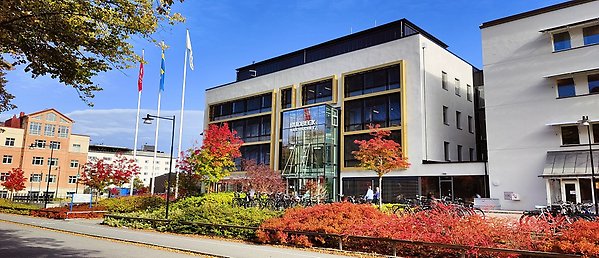Workshop on biomolecular simulations
November 9 @ 08:00 – 17:00 CET
The main focus of ‘Biomoelcular simulations workshop’ is on molecular dynamics simulations of biomolecular systems. The target audience of this workshop is the researchers working in Sweden on biomolecular simulations. The goal of this workshop is to bring together all the researchers from Sweden interested in biomolecular simulations and to provide an opportunity to junior researchers in the field to present their work. This will be a single day event with some talks by other researchers from abroad and ample opportunities for discussion and interactions among the people in the field.
Confirmed speakers
- Simon Olsson, Chalmers, Gothenburg
- Milosz Wieczor, IRB Barcelona
- Mercedes Alfonso-Prieto, Forschungszentrum Jülich
Program and abstracts are collapsible items – click to expand.
Program
| 09:30 | Morning Coffee, Mingle Inghesalen, Karolinska Institutet |
| 09:55 | Welcome from organizers Organizing Committee |
| 10:00 | Multiscale simulations to study proton transfer: from enzymes to membrane proteins Mercedes Alfonso-Prieto, Forschungszentrum Jülich, Germany |
| 10:40 | Exploring the selectivity profile of plant UDP dependent glycosyl transferases (UGTs) by computational and experimental studies Junhao Li, Uppsala University |
| 11:00 | Multi-scale Modeling of Axonal Injury (coupling of finite element analysis with molecular dynamics simulations) Maryam Majdolhosseini, KTH Royal Institute of Technology |
| 11:20 | Coffee Break |
| 11:40 | A Machine-Learned Atomistic Force Field for Nucleic Acids Miłosz Wieczór, IRB Barcelona |
| 12:20 | Combining evolution and physics with coevolution-powered machine learning Darko Mitrovic, KTH Royal Institute of Technology |
| 12:40 | Lipid-ethanol mixtures for topical drug delivery applications: A molecular dynamics and NMR study Amanda Quinones Vallin, Stockholm University |
| 13:00 | Lunch |
| 14:00 | Machine learning to reconcile experiment and simulation Simon Olsson, Chalmers University of Technology |
| 14:40 | Effective Molecular Dynamics from Neural-Network Based Structure Prediction Models Alexander Jussupow, Stockholm University |
| 15:00 | Opportunities and Challenges in GPCR SBDD: Finding the Sweet Spots Pierre Matricon, Sosei Heptares |
| 15:20 | Wrap up, Thank you Organizing Committee |
Multiscale simulations to study proton transfer: from enzymes to membrane proteins
Mercedes Alfonso-Prieto, Assistant Professor, Forschungszentrum Jülich, Germany
Proton transfer (PT) is one the most common processes in biology. Studying PT at the molecular level is a challenging task, due to the intrinsic complexity of proteins, including their functional dynamics and the presence of several titratable residues. Therefore, combination of experimental and computational techniques is needed to obtain a more comprehensive picture. Recent methodological and software advancements have enabled the efficient application of quantum mechanics/molecular mechanics (QM/MM) simulations to (large) biological systems. This multiscale approach allows treating the region of the protein where PT takes place at the QM level, while including the effect of the rest of the protein and its environment at the MM level. In this talk, I will show some examples of QM/MM simulations applied to PT processes in different systems, from enzymes to membrane proteins. Such hybrid simulations have provided atomistic insights complementary to experiments.
A Machine-Learned Atomistic Force Field for Nucleic Acids
Miłosz Wieczór, Postdoctoral fellow, IRB Barcelona
We present a new paradigm for the parametrization of nonbonded interactions in molecular force fields directly from quantum chemical data. The proposed machine-learned force field (ML-FF) accurately reproduces well-validated quantum chemical interaction energies, as well as allows for the systematic incorporation of experimental data such as measured affinity constants. Contrary to many recently published general ML-FFs, our force field ensures stability in molecular dynamics simulations thanks to a combination of regularization and active learning, and permits gradual upgrades should issues arise in previously untested systems. Meanwhile, a simple embedding scheme allows the parameters learned from minimal methyl-nucleobase systems to be employed in simulations of large biomacromolecules at virtually no computational overhead. We also present several key directions for the future evolution of our force field, both in terms of accuracy and applicability.
Machine learning to reconcile experiment and simulation
Simon Olsson, Assistant Professor, Chalmers University of Technology
Long-time-scale and enhanced sampling molecular dynamics simulations reveal the approximations of classical molecular dynamics force fields disagreeing with experimental data. However, under ideal conditions, experiments and simulations observe the same process — consequently, by optimally balancing experimental and simulation data, we may build models extracting helpful information from both. In this talk, I will overview efforts in this direction and talk about Augmented Markov models, and their recent extension dynamic Augmented Markov models.
lucie.delemotte@scilifelab.se

